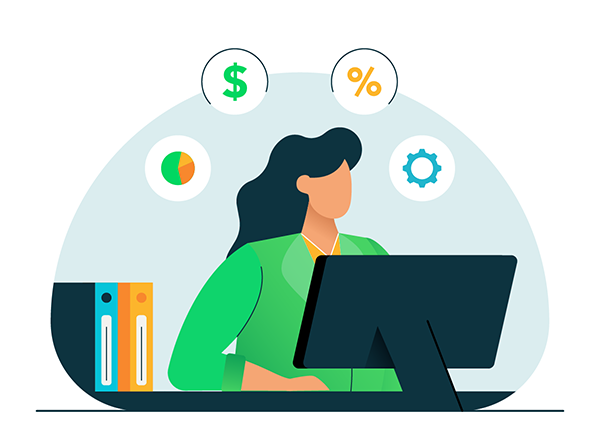Managing personal and business finances can be a challenging task, but with the right tools, it becomes much easier. Quickbooks is a highly popular accounting software that is primarily used for business accounting purposes. However, many people wonder if it can also be used for personal finance management.
The good news is that Quickbooks Online offers features that allow you to track your income, expenses, and other financial transactions for both personal and business purposes. We will explore how you can effectively use Quickbooks for managing your personal finances and seamlessly integrate it with your business accounting activities. With Quickbooks, you can have all your financial information in one place, making it convenient and efficient to handle both your personal and business finances.

Credit: quickbooks.intuit.com
Introduction To Quickbooks
QuickBooks is primarily designed as an accounting software for businesses, but it can also be used for personal finance. It offers features to help you manage your expenses, payments, and transactions, making it a versatile option for both personal and business use.
What Is Quickbooks?
Quickbooks is a widely used accounting software developed by Intuit that is designed to help individuals and businesses efficiently manage their finances. It offers a range of features and tools that make it easier to track income and expenses, create and send invoices, manage payroll, and generate financial reports.Why Is Quickbooks Popular For Managing Personal And Business Finances?
Quickbooks has gained popularity for managing both personal and business finances due to its user-friendly interface, comprehensive features, and flexibility. Here are some reasons why Quickbooks is popular: 1. Integration: Quickbooks seamlessly integrates with various financial institutions, allowing users to automatically import and categorize transactions from their bank accounts, credit cards, and other financial sources. This saves time and reduces manual data entry. 2. Expense Tracking: Quickbooks provides an intuitive expense tracking system that allows users to record and categorize expenses. This feature enables individuals and businesses to monitor their spending patterns, identify areas of overspending, and make informed financial decisions. 3. Invoicing and Payment Processing: With Quickbooks, you can easily create professional invoices and send them to clients or customers. It also offers a convenient payment processing feature that allows you to accept online payments directly from your customers. 4. Financial Reporting: Quickbooks generates detailed financial reports such as profit and loss statements, balance sheets, and cash flow statements. These reports provide a clear overview of your financial position and help you make informed decisions regarding your personal or business finances. 5. Tax Preparation: Quickbooks simplifies the tax preparation process by providing features that allow you to track and organize deductible expenses, generate reports for your accountant, and seamlessly export data for tax filing purposes. In conclusion, Quickbooks is a versatile and powerful tool for managing both personal and business finances. Its user-friendly interface, robust features, and seamless integration make it a popular choice for individuals and businesses alike. Whether you need to track expenses, generate invoices, or prepare for tax season, Quickbooks can help streamline your financial management processes.
Credit: quickbooks.intuit.com
Using Quickbooks For Personal Finances
1. Streamlined management of personal expenses
2. Easy tracking of income and expenditures
3. Automatic categorization of transactions
1. Dashboard for overall financial snapshot
2. Transaction categorization for accurate budgeting
3. Bill payment reminders and alerts
Setting up personal loans and credit cards in QuickBooks
| Step | Description |
|---|---|
| 1. | Create new account for loan or credit card |
| 2. | Link account to transactions for tracking |
| 3. | Set up payment reminders for due dates |
Using Quickbooks For Business Finances
QuickBooks is a versatile financial software designed to simplify and streamline the management of business finances. As a powerful accounting tool, QuickBooks offers several features and benefits that make it ideal for business accounting and financial management.
Benefits Of Using Quickbooks For Business Finances
- Efficient Financial Organization: QuickBooks enables businesses to efficiently manage their financial transactions, track expenses, and create professional invoices.
- Accurate Reporting: The software provides accurate financial reports, allowing businesses to make informed decisions based on real-time data.
- Time-Saving Automation: QuickBooks automates various accounting processes, saving time and reducing the likelihood of errors in financial records.
Features Of Quickbooks For Business Accounting
QuickBooks offers a range of features tailored specifically for business accounting, including:
- Invoice Management: Easily create and customize professional invoices and track payment status.
- Expense Tracking: Efficiently track and categorize business expenses to gain insight into spending patterns.
- Bank Reconciliation: Seamlessly reconcile bank transactions and maintain accurate financial records.
- Financial Reporting: Generate various financial reports to monitor the health of the business and make strategic decisions.
Separating Business And Personal Finances In Quickbooks
It is crucial to separate business and personal finances in QuickBooks to ensure accurate record-keeping and compliance with financial regulations. Implement the following practices:
- Create Separate Accounts: Set up distinct bank and credit card accounts for business and personal use to avoid commingling funds.
- Use Class Tracking: Leverage QuickBooks' class tracking feature to allocate transactions to specific classes, separating business and personal expenses effectively.
- Regular Reconciliation: Regularly reconcile accounts to ensure that there is a clear demarcation between business and personal transactions.
Comparison: Quickbooks Vs. Quicken
When it comes to managing your personal and business finances, it's crucial to have the right tools in place. Quickbooks and Quicken are two popular software options that offer different features and functionalities, tailored to different financial needs. In this discussion, we'll compare Quickbooks vs. Quicken to help you choose the right software for personal financial management.
Differences Between Quickbooks And Quicken
Quickbooks is designed for small business accounting, offering robust features such as invoicing, expense tracking, and inventory management. On the other hand, Quicken is geared towards personal finance management, focusing on budgeting, bill payments, and investment tracking.
Choosing The Right Software For Personal Financial Management
When it comes to choosing the right software for personal financial management, it's essential to consider your specific needs. Quickbooks is ideal for entrepreneurs and small business owners who need comprehensive accounting and financial management tools. On the other hand, Quicken is tailored for individuals and families looking to track expenses, budget effectively, and manage personal investments.
Tips And Best Practices For Using Quickbooks
Unlock the full potential of QuickBooks for both personal finance and business with these helpful tips and best practices. Learn how to effectively manage your finances, record transactions, and keep your business and personal accounts separate. Plus, discover the benefits of using QuickBooks for home accounting and find out if it's the right tool for you.
Maximizing The Use Of Quickbooks For Personal And Business Finances
Utilize Quickbooks to efficiently manage both personal and business finances, ensuring accurate tracking and reporting.
Separate accounts clearly for personal and business transactions to maintain proper financial records.
- Designate specific categories: Categorize expenses and income appropriately for distinct financial analysis.
- Regular reconciliation: Reconcile accounts consistently to avoid discrepancies and ensure financial accuracy.
- Utilize reporting features: Generate reports to gain insights into financial performance and make informed decisions.
Common Challenges And How To Overcome Them
Address common hurdles encountered when using Quickbooks for personal and business finances.
- Data entry errors: Double-check entries to prevent inaccuracies in financial records.
- Integration issues: Ensure seamless integration with other financial tools for comprehensive insights.
- Time management: Allocate dedicated time for financial tasks to maintain an organized financial system.
Recommended Resources And Courses For Learning Quickbooks
Enhance your understanding of Quickbooks through recommended resources and courses.
- Quickbooks Online Training: Enroll in online courses provided by Quickbooks to learn the platform intricacies.
- Financial Management Courses: Explore financial management courses to grasp fundamental concepts beneficial for Quickbooks usage.
- Community Forums: Engage with Quickbooks user communities for tips, tricks, and best practices shared by experienced users.

Credit: synder.com
Frequently Asked Questions For Can You Use Quickbooks For Personal Finance And Business
Can I Use Quickbooks For Both Personal And Business Accounts?
Yes, you can manage both personal and business accounts in QuickBooks, but keep business and personal transactions separate.
Does Anyone Use Quickbooks For Personal Finance?
Yes, you can use QuickBooks for personal finance and it's popular for managing at-home finances. QuickBooks offers courses to help users learn to manage personal finances. While designed for business accounting, it can also serve as a personal finance management tool.
Is Quickbooks For Business Or Personal Use?
Yes, QuickBooks is suitable for both personal and business use. You can manage all expenses, payments, and transactions in one place, making it ideal for home accounting and business purposes.
Is There Something Like Quickbooks For Personal Use?
Yes, Quicken is like QuickBooks for personal use, tracking your account balances, transactions, investments, and personal budgeting.
Conclusion
When managing personal and business finances in QuickBooks, prioritize separating transactions for accuracy and clarity. Utilize QuickBooks as a versatile tool for both personal finance and business accounting needs. Strive to maintain clear distinctions between personal and business expenses for organized financial management.






0 Comments